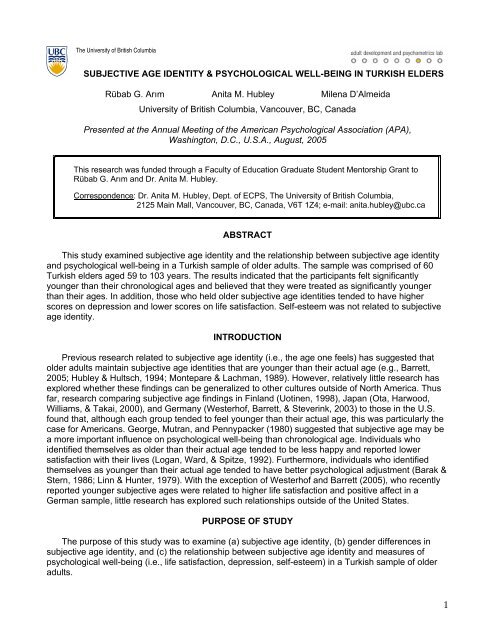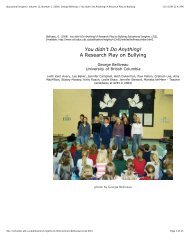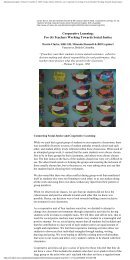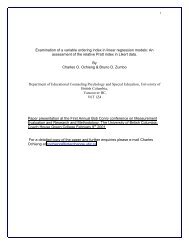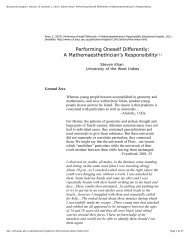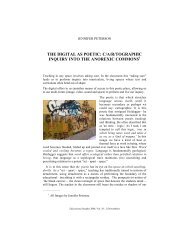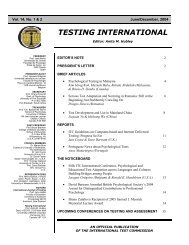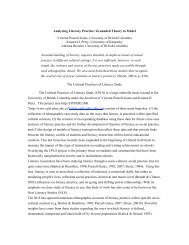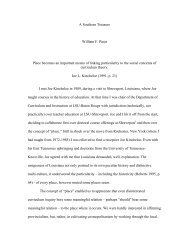"I'm more than a cookie-baking grandma" - Faculty of Education ...
"I'm more than a cookie-baking grandma" - Faculty of Education ...
"I'm more than a cookie-baking grandma" - Faculty of Education ...
Create successful ePaper yourself
Turn your PDF publications into a flip-book with our unique Google optimized e-Paper software.
The University <strong>of</strong> British Columbia<br />
SUBJECTIVE AGE IDENTITY & PSYCHOLOGICAL WELL-BEING IN TURKISH ELDERS<br />
Rübab G. Arım Anita M. Hubley Milena D’Almeida<br />
University <strong>of</strong> British Columbia, Vancouver, BC, Canada<br />
Presented at the Annual Meeting <strong>of</strong> the American Psychological Association (APA),<br />
Washington, D.C., U.S.A., August, 2005<br />
This research was funded through a <strong>Faculty</strong> <strong>of</strong> <strong>Education</strong> Graduate Student Mentorship Grant to<br />
Rübab G. Arım and Dr. Anita M. Hubley.<br />
Correspondence: Dr. Anita M. Hubley, Dept. <strong>of</strong> ECPS, The University <strong>of</strong> British Columbia,<br />
2125 Main Mall, Vancouver, BC, Canada, V6T 1Z4; e-mail: anita.hubley@ubc.ca<br />
ABSTRACT<br />
This study examined subjective age identity and the relationship between subjective age identity<br />
and psychological well-being in a Turkish sample <strong>of</strong> older adults. The sample was comprised <strong>of</strong> 60<br />
Turkish elders aged 59 to 103 years. The results indicated that the participants felt significantly<br />
younger <strong>than</strong> their chronological ages and believed that they were treated as significantly younger<br />
<strong>than</strong> their ages. In addition, those who held older subjective age identities tended to have higher<br />
scores on depression and lower scores on life satisfaction. Self-esteem was not related to subjective<br />
age identity.<br />
INTRODUCTION<br />
Previous research related to subjective age identity (i.e., the age one feels) has suggested that<br />
older adults maintain subjective age identities that are younger <strong>than</strong> their actual age (e.g., Barrett,<br />
2005; Hubley & Hultsch, 1994; Montepare & Lachman, 1989). However, relatively little research has<br />
explored whether these findings can be generalized to other cultures outside <strong>of</strong> North America. Thus<br />
far, research comparing subjective age findings in Finland (Uotinen, 1998), Japan (Ota, Harwood,<br />
Williams, & Takai, 2000), and Germany (Westerh<strong>of</strong>, Barrett, & Steverink, 2003) to those in the U.S.<br />
found that, although each group tended to feel younger <strong>than</strong> their actual age, this was particularly the<br />
case for Americans. George, Mutran, and Pennypacker (1980) suggested that subjective age may be<br />
a <strong>more</strong> important influence on psychological well-being <strong>than</strong> chronological age. Individuals who<br />
identified themselves as older <strong>than</strong> their actual age tended to be less happy and reported lower<br />
satisfaction with their lives (Logan, Ward, & Spitze, 1992). Further<strong>more</strong>, individuals who identified<br />
themselves as younger <strong>than</strong> their actual age tended to have better psychological adjustment (Barak &<br />
Stern, 1986; Linn & Hunter, 1979). With the exception <strong>of</strong> Westerh<strong>of</strong> and Barrett (2005), who recently<br />
reported younger subjective ages were related to higher life satisfaction and positive affect in a<br />
German sample, little research has explored such relationships outside <strong>of</strong> the United States.<br />
PURPOSE OF STUDY<br />
The purpose <strong>of</strong> this study was to examine (a) subjective age identity, (b) gender differences in<br />
subjective age identity, and (c) the relationship between subjective age identity and measures <strong>of</strong><br />
psychological well-being (i.e., life satisfaction, depression, self-esteem) in a Turkish sample <strong>of</strong> older<br />
adults.<br />
1
Participants<br />
METHOD<br />
The sample was comprised <strong>of</strong> 60 Turkish elders aged 59 to 103 years (M = 78.1, SD = 8.69)<br />
residing in two seniors’ houses in Istanbul, Turkey. Nearly 76% <strong>of</strong> the sample was female. In terms <strong>of</strong><br />
educational level, 25% <strong>of</strong> the participants indicated that they did not complete high school, 13.3%<br />
completed high school, 35% had some post-secondary education, and 26.7% had a university or a<br />
post graduate level degree.<br />
Procedure<br />
The participants completed a demographic form and the following questionnaires in Turkish:<br />
Subjective Age Identity Scale (Michalos, Hubley, Zumbo, & Hemingway, 2001): measures physical<br />
age, mental age, social age, look age, desired age, and the age one is treated. Based on a factor<br />
analysis, using principal axis factoring, a mean subjective age identity score was computed for each<br />
participant by averaging the scores on the physical age, mental age, social age, look age, and desired<br />
age items, with higher scores indicating older subjective age identities (alpha= .82). The ‘age one is<br />
treated’ item was used as a separate measure. Subjective age identity and ‘age one is treated’ were<br />
correlated .39 (p
DISCUSSION<br />
This appears to be the first study to evaluate subjective age identity with a Turkish sample. Our<br />
results indicated that Turkish elders reported subjective age identities that were younger <strong>than</strong> their<br />
actual age and believed that they were treated as younger <strong>than</strong> their age. This is consistent with<br />
previous subjective age research with older adults (e.g., Hubley & Hultsch, 1994; Montepare &<br />
Lachman, 1989; Westerh<strong>of</strong> et al., 2003). Similar to many studies (e.g., Baum & Boxley, 1983; Hubley<br />
& Hultsch, 1994; Uotinen, 1998), we found no gender differences in the subjective age identity<br />
measures. A younger subjective age identity was associated with higher levels <strong>of</strong> life satisfaction and<br />
lower levels <strong>of</strong> depressive symptomatology. Thus, the findings with Turkish elders were similar to<br />
those found with North American (Logan et al., 1992) and German seniors (Westerh<strong>of</strong> & Barrett,<br />
2005). Self-esteem was not found to be related to subjective age identity. More research is needed<br />
that examines (a) the relationships between subjective age and different indicators <strong>of</strong> well-being, and<br />
(b) cross-cultural comparisons <strong>of</strong> aging and age identity.<br />
3
REFERENCES<br />
Barak, B., & Stern, B. (1986). Subjective age correlates: A research note. The Gerontologist, 26, 571-578.<br />
Barrett, A. E. (2005). Gendered experiences in midlife: Implications for age identity. Journal <strong>of</strong> Aging Studies,<br />
19, 163-183.<br />
Baum, S. K., & Boxley, R. L. (1983). Age identification in the elderly. Gerontologist, 23, 532-537.<br />
Çuhadaroğlu F. (1985). Self-esteem among adolescents. Unpublished master’s thesis, Hacettepe University,<br />
Ankara, Turkey.<br />
Diener, E., Emmons, R., Larsen, R., & Griffin, S. (1985). The Satisfaction with Life Scale. Journal <strong>of</strong> Personality<br />
Assessment, 49, 71-75.<br />
Ertan, T., Eker, E., & Şar, V. (1997). Geriatrik Depresyon Ölçeği'nin Türk yaşlı nüfusunda geçerlilik ve<br />
güvenilirliği [The validity and the reliability <strong>of</strong> the Geriatric Depression Scale in older Turkish population] .<br />
Nöropsikiyatri Arşivi [Archives <strong>of</strong> Neuropsychiatry], 34, 62-71.<br />
George, L. K., Mutran, E. J., & Pennybacker, M. R. (1980). The meaning and measurement <strong>of</strong> age identity.<br />
Experimental Aging Research, 6, 283-298.<br />
Hubley, A. M., & Hultsch, D. F. (1994). The relationship <strong>of</strong> personality trait variables to subjective age identity in<br />
older adults. Research on Aging, 16, 415-439.<br />
Linn, M. W., & Hunter, K. (1979). Perceptions <strong>of</strong> age in the elderly. Journal <strong>of</strong> Gerontology, 34, 46-52.<br />
Logan, J. R., Ward, R., & Spitze, G. (1992). As old as you feel: Age identity in middle and later life. Social<br />
Forces, 71, 451-467.<br />
Michalos, A. C., Hubley, A. M., Zumbo, B. D., & Hemingway, D. (2001). Health and other aspects <strong>of</strong> the quality<br />
<strong>of</strong> life <strong>of</strong> older people. Social Indicators Research: An International and Interdisciplinary Journal for Quality<strong>of</strong>-Life<br />
Measurement, 54, 239-274.<br />
Montepare, J. M., & Lachman, M. E. (1989). “You’re only as old as you feel”: Self-perceptions <strong>of</strong> age, fears <strong>of</strong><br />
aging, and life satisfaction from adolescence to old age. Psychology and Aging, 4, 73-78.<br />
Ota, H., Harwood, J., Williams, A., & Takai, J. (2000). A cross-cultural analysis <strong>of</strong> age identity in Japan and the<br />
United States. Journal <strong>of</strong> Multilingual and Multicultural Development, 21, 33-41.<br />
Rosenberg, M. (1965). Society and the adolescent self-image. Princeton, NJ: Princeton University Press.<br />
Westerh<strong>of</strong>, G. J., & Barrett, A. E. (2005). Age identity and subjective well-being: A comparison <strong>of</strong> the United<br />
States and Germany. Journal <strong>of</strong> Gerontology: Social Sciences, 60B, S129-S136.<br />
Westerh<strong>of</strong>, G. J., Barrett, A. E., & Steverink, N. (2003). Forever young: A comparison <strong>of</strong> age identities in the<br />
United States and Germany. Research on Aging, 25, 366-383.<br />
Uotinen, V. (1998). Age identification: A comparison between Finnish and North- American cultures.<br />
International Journal <strong>of</strong> Aging and Human Development, 46, 109-124.<br />
Yesavage, J. A., Brink, T. L., Rose, T. L., Lum, O., Huang, V., Adey, M., & Leirer, V. O. (1983). Development<br />
and validation <strong>of</strong> a geriatric depression rating scale: A preliminary report. Journal <strong>of</strong> Psychiatric Research, 5,<br />
165-172.<br />
Yetim, Ü. (1993). Life satisfaction: A study based on the organization <strong>of</strong> personal projects. Social Indicators<br />
Research, 29, 277-289.<br />
4
Table 1<br />
Means and Standard Deviations <strong>of</strong> Subjective Age Identity and Age One is Treated<br />
Variables by Gender<br />
Variable<br />
Subjective age identity<br />
Age one is treated<br />
Males<br />
2.57<br />
(.85)<br />
2.42<br />
(.90)<br />
Females<br />
2.65<br />
(.71)<br />
2.60<br />
(.86)<br />
Total Sample<br />
2.62<br />
(.74)<br />
2.55<br />
(.86)<br />
Note. Possible scores on the subjective age identity and ‘age one is treated’ variables ranged from<br />
1 (much younger <strong>than</strong> my age) to 3 (about the same as my age) to 5 (much older <strong>than</strong> my age).<br />
Figure 1. Correlations among Subjective Age Identity, Self-Esteem, Depression, and Life Satisfaction<br />
Self-Esteem<br />
r = .12, n.s<br />
Subjective Age Identity<br />
r = .38, p


